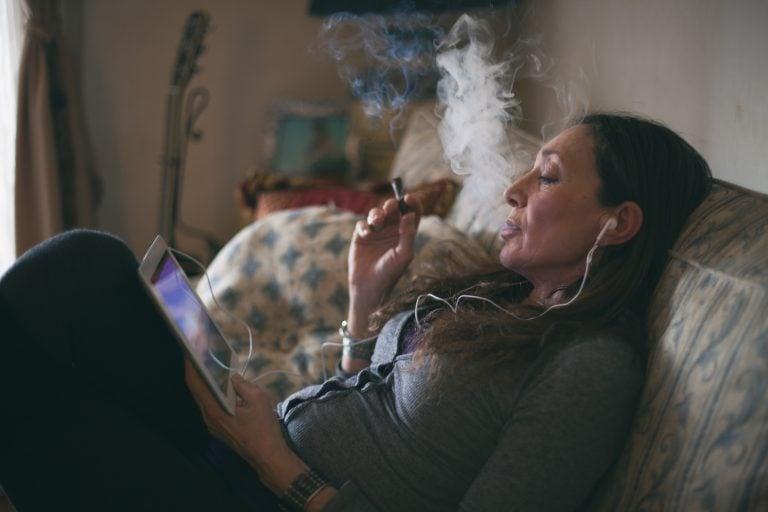Will a medical marijuana prescription allow me to smoke at work or in my condo?
Both employers and condo boards can insist on a reasonable compromise, and safety trumps all

(Getty Images)
Share
Can’t you just tell your boss or my condo board you have anxiety, if they come after you for smoking on the job or in my apartment? How far will medical exemptions get you, exactly?
Theoretically, pretty far. “If someone has a valid medical authorization—that is, they’ve gone to their doctor and have a prescription—it basically triggers their human rights protections as someone with a physical or mental disability,” says Alison McMahon, CEO of education and recruitment organization Cannabis at Work. The employer has a duty to accommodate their employee, which usually means obtaining medical information to adjust the worker’s role, expectations and schedule as necessary.
Still, explains McMahon, any particular set of special accommodations gets to be “reasonable in context of the employer’s policy.” That means even with prescription in hand, you won’t be toking at your desk. All smoking is forbidden by the Smoke-Free Places Act, which includes enclosed workplaces and public spaces. A medical licence might help you dodge a ticket for smoking where you shouldn’t, but some restrictions are more enforced than others. Don’t even think of lighting up too close to a hospital or daycare, for example. Legislation varies by province, as do bylaws by municipalities, but most medical cannabis smokers will find themselves stepping off work property (and a specified number of metres away from the door) to imbibe.
Then might they butt out and get back to work? Not quite. “Here’s where it gets muddy,” says McMahon, “because the employer under no circumstances has to accommodate impairment.” In fact, and especially if the worker has any kind of safety-sensitive position, the workplace has a duty to expect and ensure workers are not impaired. “We’re all looking for that Holy Grail test of impairment,” says McMahon, “because impairment is the unsolved problem here.” Drug tests are by no means a broadly accepted practice to Canadians; they’re typically only allowed under certain circumstances (like pre-employment or post-incident) and in safety-sensitive workplaces. Even if pot-smoking employees agreed to drug-tests that prove they weren’t surpassing the doctor’s orders, variables make such a test completely unreliable. “It’s all very situational, depending on the person, diagnosis, strain, amount, time of day, tolerance.”
How much leeway your boss allows likely depends on your affliction. “If someone has MS or cancer or AIDS, we can all accept their cannabis. But if they have something like anxiety, people get judgmental and stigma comes into play,” says McMahon. Since these decisions belong between patients and doctors, and are not the business of their bosses, workers don’t need to divulge the details. “Employers can’t ask and employees do not have to disclose their diagnosis, only their prognosis.” HR will probably want to know if your illness is long- or short-term, if and when you’ll get better, and what impact it will have on your job.
All these rights apply equally to the home front: “If someone’s using cannabis to treat a medical condition or illness, that’s a human rights issue,” says Trina Fraser, partner at Brazeau Seller and self-described “cannabis lawyer.” While landlords and condo boards are going rogue with cannabis bans in their contracts, enforcing these clauses could be disastrous if the tenant has a prescription proper in hand. “I’ve been telling landlords, ‘If you try to evict someone for medical marijuana, expect to get slapped by the human rights tribunal,’ ” she says. The Residential Tenancies Act, meanwhile, says you can’t be evicted for merely breaching a clause in your contract. “The basis for eviction are specifically laid out in the act, like not paying your rent, conducting an illegal activity, causing undue damage or interfered with the reasonable enjoyment of the premise by other tenants.”
In a world with totally legal weed, only the latter could conceivably count as basis to boot you from your home. “But what level of proof is going to be sufficient? How are the rights of the person next door to not smell smoke going to balance with the rights of a patient to consume their medicine?” asks Fraser. Nobody knows just yet, but in the meantime, landlords wanting to avoid the courts should think more about accommodating and less about banning pot smokers. “Maybe you add weather stripping under the door, or provide an outdoor common area for smoking, or maybe it’s reasonable to ask tenants to smoke on the balcony instead,” she says. “And remember: people tend to follow reasonable rules and ignore the unreasonable ones.”